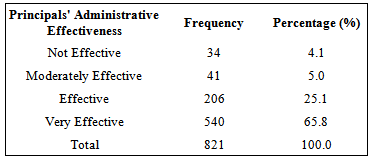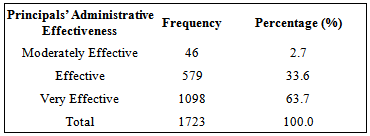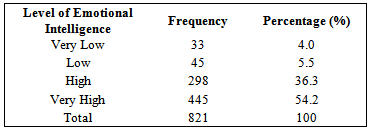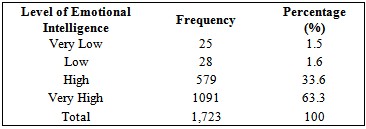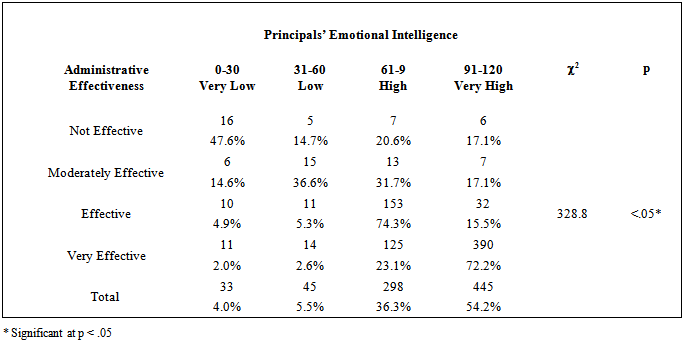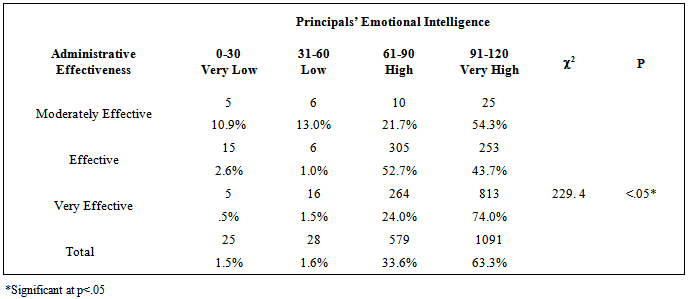-
Paper Information
- Paper Submission
-
Journal Information
- About This Journal
- Editorial Board
- Current Issue
- Archive
- Author Guidelines
- Contact Us
International Journal of Psychology and Behavioral Sciences
p-ISSN: 2163-1948 e-ISSN: 2163-1956
2014; 4(2): 79-85
doi:10.5923/j.ijpbs.20140402.03
Emotional Intelligence and Administrative Effectiveness of Secondary School Principals in Southwestern Nigeria
W. O. Adeniyi, B. A. Omoteso
Department of Educational Foundations and Counselling, Faculty of Education, Obafemi Awolowo University, Ile-Ife, Nigeria
Correspondence to: W. O. Adeniyi, Department of Educational Foundations and Counselling, Faculty of Education, Obafemi Awolowo University, Ile-Ife, Nigeria.
| Email: |  |
Copyright © 2014 Scientific & Academic Publishing. All Rights Reserved.
The paper examined the relationship between emotional intelligence and administrative effectiveness of secondary school principals. This was with a view to suggesting ways of improving principals’ administrative effectiveness. The sample was made up of 821 teachers and 1,723 students who were drawn from 53 public secondary schools in four states in Southwestern, Nigeria using multistage and purposive sampling techniques. Two instruments: Principals’ Administrative Effectiveness Questionnaire” (PAEQ) and “Principals’ Emotional Intelligence Questionnaire” (PEIQ) were administered on the respondents to collect data. The results revealed that 65.8% of the teachers responded that secondary principals were very effective. It was showed that 54.2% of the teachers indicated that most principals possessed very high level of emotional intelligence. Lastly, the result revealed a significant relationship between levels of emotional and administrative effectiveness of secondary school principals (χ2 = 328.8, p < 0.05). It was concluded that the principals possessed very high level of emotional intelligence and that had imparted on their administrative effectiveness.
Keywords: Emotional intelligence, Administrative effectiveness, Principals
Cite this paper: W. O. Adeniyi, B. A. Omoteso, Emotional Intelligence and Administrative Effectiveness of Secondary School Principals in Southwestern Nigeria, International Journal of Psychology and Behavioral Sciences, Vol. 4 No. 2, 2014, pp. 79-85. doi: 10.5923/j.ijpbs.20140402.03.
Article Outline
1. Introduction
- The position of secondary school principals involves a lot of administrative responsibilities and commitment. Principals are the bridge builders in secondary schools. Hence, they are expected to produce results irrespective of whether the situations are in their favour or not. Principals are required to think of solutions to various challenges such as staff indiscipline, staff non-commitment, internal and external relations, and students’ academic performance that may crop up every now and then. Concomitant to this is that no principal can succeed in realizing the objectives and goals of secondary school education without having skills on how to effectively carry out his administrative functions. The absence of such skills may impede favourable learning environment and possibly result to problems such as examinations malpractice, cultism, academic incompetence, indiscipline among students and staff, as well as the poor attitude of teachers to teaching. Those were what Omoregie (2005), cited as some of the prevailing problems in most secondary schools in Nigeria. In view of the above submission, it is necessary that school principals need to provide safe school environment which will facilitate meaningful instructional activities. However, no principal can achieve this without being able to perform his internal relations and organisational roles effectively. Therefore, an effective principal should be someone who is able to promote an atmosphere of respect and trust and makes the teachers and students have a sense of belonging.Apart from this, principals’ administrative effectiveness can be viewed as the extent to which secondary school principals achieve the goals and objectives of their schools. It also refers to the ability of school principals to carry out administrative tasks related to instructional management, internal relations, organisation management, administration, students’ performance and school-community relations toward achieving the school goals and objectives. In view of this, the tasks of proactive principals include among other things, coordinating both human and material resources available and using them systematically for the achievement of educational objectives.From all indications, the administrative responsibilities of secondary school principals cannot be under-estimated. Okotoni and Okotoni (2003) and Arikewuyo (2009) found that most secondary school principals were not effective in their administrative functions. Although, Tirozzi (2001) stated that for effective realisation of school policies, the management responsibilities should not be exclusively for the principals. However, they will be held responsible for whatever happens in their schools (Copland 2001). This explains why principals are considered as responsible avenue for the smooth running of schools. Consequently, principals must possess certain qualities in order to achieve success in the schools. It is assumed that an effective principal must be someone who is pragmatic, dynamic, warm-hearted, attentive, emotionally mature and of pleasant personality. Besides, an effective and efficient principal is regarded as a standard-setter and a crucial component of the social system. Hence, a school without the right type of leadership can best be described as a scene of confusion and chaos. According to Ross and Gray (2006) and Ibukun (1997), when leadership in an organisation is effective, there is progress but when the leadership is defective, the organisation declines and decays.Considering the above points, it is pertinent to say that if secondary schools are to rise to the current challenges set before them, they will require outstanding leaders with exceptional leadership skills, including interpersonal skills that have become integral to effective leadership (Goleman, 1998). Where leaders were once seen to control, plan, and inspect the overall running of an organisation in today’s successful organisations, leaders must motivate and inspire others, foster positive attitudes, and create a sense of contribution and importance with and among subordinates (Hogan, Curphy & Hogan, 1994). In essence, school principals will need to hone their leadership skills in order to provide the type of the principal that can move the school forward. Today, there is still considerable controversy over the construct of emotional intelligence as a measure of ability and how it relates to the principal’s effectiveness. In recognition of this, Palmer (2001) stated that despite the recent popularity of the construct, exactly how and to what extent emotional intelligence accounts for the principal effectiveness is unknown. What seems most interesting is that leadership is not always about being smarter or tougher. It is more about the qualities of motivation, empathy, integrity, and intuitive abilities, which are part of the domain of emotional intelligence (Lunenburg & Ornstein, 2004). Besides, Goleman, Boyatzis and Mckee (2002) disclosed that what sets the best leaders apart from others is the understanding of the powerful role the emotions plays in the workplace. According to Goleman (1998), emotional intelligence is a person’s ability to recognise personnel feelings and those of others and to manage emotions within themselves and in their relationships with others. From the definition, it can be pointed out that an emotional intelligent principal is that leader who is able to perceive one’s emotion and remains aware of them as they happen. To be able to manage emotional reactions in all situations and with all people, implies that one understands what other people are thinking and feeling even though the perceiver does not feel the same way, and provides clear communication and effectively handle conflict that may arise. Because of this, Caruso, Salovey and Mayer (2003) asserted that principals need emotional intelligence to be successful in their schools. It implies that a school leader needs to be emotionally intelligent so as to possess conflict resolution skills. Casper (2001) revealed that there is no better method for getting the most out of others or for attaining personal fulfillment than mastering emotional intelligence. This is because understanding our emotions will assist us to understand, control and use emotions in solving problems of personal and interpersonal nature. In their own submission, Noyes (2001) and Chastuskhina (2002) expressed that the leaders with high level of emotional intelligence will positively apply social skills to influence others, create strong relationships with clients and employees. Also, Cherniss and Goleman (2001) established a significant relationship between emotional intelligence and the performance of a leader. Further, Cherniss, et al. explained that an emotionally intelligent principal will have a greater effect in his school than a principal with a low level of emotional intelligence. Without any iota of doubt, emotional intelligence is an integral part of school management process; and, if a principal expects to guide his school in the right directions, he needs to be able to deal effectively with emotions. Goleman, et.al (2002) confirmed that great leaders have the ability to work through emotions. In his opinion, Fullan (2003) observed that effective leaders combine a strong sense of moral purpose, an understanding of dynamics of change, and great emotional intelligence as they relate with their subordinates. Apart from this, secondary school principals must be able to influence and understand relationships and the feelings and emotions of those they serve and lead. This is because, if a leader is not sensitive to his own feelings, it may be difficult for him also to be sensitive to the feelings of the people around him and this will ultimately affect their relationship. Moreover, Goleman (1998) postulated that emotional intelligence plays a significant role in leadership effectiveness. The leaders who have high levels of emotional intelligence have a greater effect on an organisation than their counterparts who have lower levels of emotional intelligence. As long as the principal as an instructional leader has a significant effect on student performance (Waters, Marzano, & McNulty 2003), and if emotional intelligence had a significant effect on secondary school principals’ leadership performance, increasing emotional intelligence may be of assistance to the principals, as they face the demands of public/society to improve students’ achievement. Also, a theory known as interactionist-communicative (Riggio & Reichard, 2008) indicated relationship between leaders’ emotional intelligence and subordinates’ work outcomes. First, awareness of emotion in the self can contribute to a clarification of emotions, and clarification of emotions has been shown to contribute to low stress levels (Salovey, Mayer Goldman, Turvey & Palfai, 1995). Rosete & Ciarocchi (2005) revealed that leaders’ ability to perceive ones’ own emotions has significant relationship with leadership effectiveness and to leaders’ actual performance. The results also indicate that leadership ability to perceive other people’s emotions is a predictor of leaders’ performance. From transformational leadership perspective, the ability to understand other’s emotions serves as a skill of a principal’s effectiveness (Bass & Avolio, 1994). Researchers such as Kellett, Humphrey, & Sleeth (2006) and Wolff, Pescosolido, Druskat, & Urch (2002) who examined the relationship between emotional intelligence and leadership confirm that empathy, as a key aspect of emotional intelligence, contributes to leadership effectiveness. Also agreed with the statement are Wong & Law (2002) that managers’ self-reported accuracy in perceiving others’ emotions was positively associated with employees’ job satisfaction. Sequel to the above, it is suffice to infer that leaders’ use of emotion may have beneficial effects for followers. In Kerr, Garvin, Heaton & Boyle’s study (2006), the MSCEIT dimension of using emotion was related more positively to employees’ ratings of leaders’ effectiveness than leaders’ emotion recognition abilities. Although the research evidence on the effects of this particular dimension of leaders’ emotional intelligence skills is limited, the related theory and research (e.g., Brundin, Patzelt, & Shepherd, 2008; Newcombe & Ashkanasy, 2002) suggested that using emotions has beneficial outcomes on employees’ motivation through cognitive and affective routes. For example, Sy, Côté & Saavedra (2005) demonstrated experimentally that leaders’ affectivity could raise (or lower) followers’ mood.Although not addressing emotional intelligence specifically, Bennis (1999) maintained that exemplary leaders will be distinguished by the mastery of the softer side: people’s skills, taste, judgement, and, above all, character. There is a widespread belief among many researchers that there is a relationship between emotional intelligence and leadership performance. However, the extent of relationship of this with administrative effectiveness secondary school principals is yet to be ascertained. Besides, the level of administrative effectiveness of principals needs to be established. These are the thrust of this paper.
1.1. Objectives of the Study
- The objectives of the study were to1. establish the administrative effectiveness of secondary school principals in Southwestern Nigeria;2. ascertain the level of emotional intelligence of secondary school principals; and3. investigate the relationship between emotional intelligence and administrative effectiveness of secondary school principals.
1.2. Research Questions
- From the above objectives, the following research questions were asked:1. How effective are the secondary school principals in Southwestern Nigeria in discharging their administrative duties?2. What is the level of emotional intelligence of secondary school principals?
1.3. Research Hypothesis
- 1. There is no significant relationship between levels of emotional intelligence and administrative effectiveness of secondary school principals in Southwestern Nigeria.
2. Methodology
- The descriptive survey design was adopted for this study. The population for the study consisted of teachers and students in secondary schools in Southwestern Nigeria. The sample size comprised of 821 teachers and 1,723 students who were selected from 53 public secondary schools. The multistage and purposive sampling techniques were employed to select the study sample. Four states were selected from the six states in Southwestern Nigeria using simple random technique. From each state, five local government areas (LGAs) were selected using simple random sampling technique. Three schools were selected from each LGA using purposive sampling technique making a total of 60 schools. The teachers were selected from 53 schools using purposive sampling technique, while 1,723 students were selected using stratified sampling method with sex and age as strata. Purposive technique was used to select the teachers who have spent at least two years in their current schools. It is believed that two years is adequate to understand someone’s level of emotional intelligence. Two research instruments were used to collect data. These were Principals’ Administrative Effectiveness Questionnaire” (PAEQ) and “Principals’ Emotional Intelligence Questionnaire” (PEIQ). PAEQ was designed for teachers and students to collect information on the administrative effectiveness of secondary school principals. The instrument sought information on the six major areas of principals’ administrative effectiveness, namely: instructional management, internal relations, organisational management, administration, external relations and students’ performance. The instrument consisted of 48 items. The respondents were asked to respond to the items using a Five-Point Likert rating Scale of “Very Effective”, “Effective”, “Less Effective”, “Not Effective” and “Undecided” which were coded 4, 3, 2, 1, and 0 respectively. The instrument was adapted from the works of Arikewuyo (2007), Orange County Schools (2008) and Grissom & Loeb (2009). The PEIQ consisted of 30 items on principal emotional intelligence. This instrument was designed for the principals, teachers and students. The respondents were asked to respond, following a five-point Likert rating scale of Strongly Agree to Undecided. The PEIQ was an adapted instrument from the works of Petrides et.al (2001) and Cook (2006). The reliability tests of the instruments were conducted on the two sets of respondents 40 teachers and 60 students using Cronbach’s Alpha and Spearman Brown Split-Half Coefficient. These two methods assisted in revealing the internal consistency of the instruments. The results of the reliability tests conducted were as follows: For students’ version, PEIQ and PAEQ yielded alphas results of 0.95 and 0.91. The Spearman Brown Coefficients results for the two instruments also showed that PEIQ = 0.90 and PAEQ = 0.96. The reliability tests for the teachers’ version indicated that PEIQ and PAEQ had alphas of 0.85 and 0.95. Also, the Spearman Brown Split-half correlational analysis performed on the two instruments (PEIQ and PAEQ) reported correlation coefficients of 0.88 and 0.90 respectively. Thus, the reliability tests obtained from the two instruments indicated that both instruments had good internal consistency, which were adequate enough for the study. Descriptive statistics and chi-square statistics were employed to analyse the data. Chi-square statistics was employed to test the hypothesis because both the independent and dependent variables were categorical. Research Question 1: How effective are the secondary school principals in Southwestern Nigeria in discharging their administrative duties?Table 1a shows the responses of students on the administrative effectiveness of secondary school principals. The Table reveals that 65.8% of the teachers reported that their principals were very effective, 25.1% indicated that their principals were effective. On the whole, 5.0% of the respondents reported their principals to be moderately effective and the remaining 4.1% of the respondents revealed that their principals were not effective. This descriptive analysis shows that majority of the teachers sampled reported that their secondary school principals were very effective in their administrative duties.
|
|
|
|
|
|
3. Discussion
- One of the major findings of this study was that the majority of secondary school principals were very effective in discharging their administrative functions. This is a confusing result, judging from the series of problems that are prevailing in most secondary schools in Nigeria. Similar studies had been previously conducted in Osun and Kwara States by Okotoni and Okotoni (2003) and Arikewuyo(2009) who found that most secondary school principals were not effective in their administrative functions. Though Copland (2001) believed that the principals will be held responsible for whatever happens in their schools, yet, Tirozzi (2001) stated that for effective realisation of school policies, the management responsibilities should not be major task of the principal. Therefore, the problem of indiscipline in school goes beyond the ineffectiveness of principals. Principals alone should not be blamed for the state of the problems in secondary schools nowadays. Rather, the problems should be shared by all stakeholders (parents, teachers, students, principals and government) in secondary education. More importantly, leadership in education sector is a dynamic process where an individual is not responsible to shoulder the group duties, but actively enjoys the partnership and dedication of all the stakeholders in achieving schools goals and objectives. Hence, schools must be seen as an ecosystem where several stakeholders work together to build successful schools. Where there is no teamwork, the effective management of schools is impeded because the principal efforts only are not enough in producing the required result in the school. The major factor is that every stakeholder should develop a positive mindset to contribute its quota towards the realisation of school goals and objectives. It was also revealed from the responses of the teachers and students that most principals had a very high emotional intelligence. This perhaps explained why it was established in this study that most principals are very effective in discharging their administrative duties. More so, that Noyes (2001) and Chastukhina (2002) had acknowledged that leaders that are very effective possess high emotional intelligence.In conclusion, the findings reveal that both teachers and students agreed that the levels of emotional intelligence did influence the administrative effectiveness of principals. In secondary schools, it is important that principals understand feelings and emotions of those they serve and lead and so provide effective ways of handling their feelings. This is the only antidote for getting the best out of the people they lead. Thus, Caruso et al. (2003), Donaldson-Feilder et al. (2004) and Kellett, Humphrey and Sleeth (2006) agreed that levels of emotional intelligence significantly influence the performance of a leader. They further stated that principals with high level of emotional intelligence tend to perform better that than those with low level of emotional intelligence. Good interpersonal skill is sine-qua-non to effective leadership. Hence, it is the duty of good leaders to maintain quality interactions among themselves and their followers. Thus, it is imperative that leaders should have high level of emotional intelligence that will equip them with strong interpersonal skills in order to be able to get along with others. Apart from this, if a leader possesses strong emotional skills, such a leader will be able to perceive the tone of the school and this will provide him with the appropriate skills in discharging his official duties.
4. Conclusions/Recommendations
- This study concluded that secondary school principals in southwestern Nigeria were very effective in discharging their administrative duties and this was as a result of the very high level of emotional intelligence they possessed, which had given them right skills in school management. It thus recommended that for principals to be able to manage their schools well, such principals need to first of all understand that they have great influence within the schools and outside the schools. Hence, school principals should have the necessary knowledge of their subordinates and also try to establish pleasant social interactions with them. In doing this, principals should know that they should not create unnecessary familiarity or be too rigid in the schools.Finally, principals should display high level of emotional intelligence in the schools. By doing this, such principals will be able to influence the ways teachers and students feel, and also have strategies of dowsing the unpleasant situations in the schools, whenever it is happened.
ACKNOWLEDGEMENTS
- The authors wish to acknowledge all the schools, teachers and students who took part in the questionnaire administration. Also, to the secretary who did the typing of the work. May God bless you richly.
 Abstract
Abstract Reference
Reference Full-Text PDF
Full-Text PDF Full-text HTML
Full-text HTML